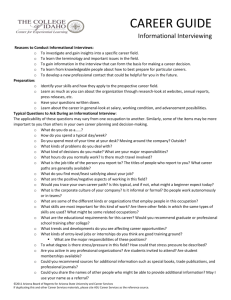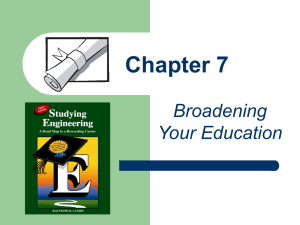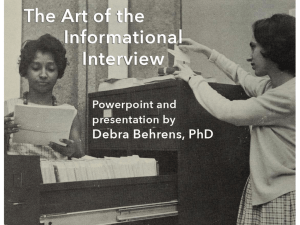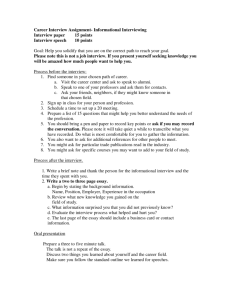Guide to Informational Interviewing
advertisement
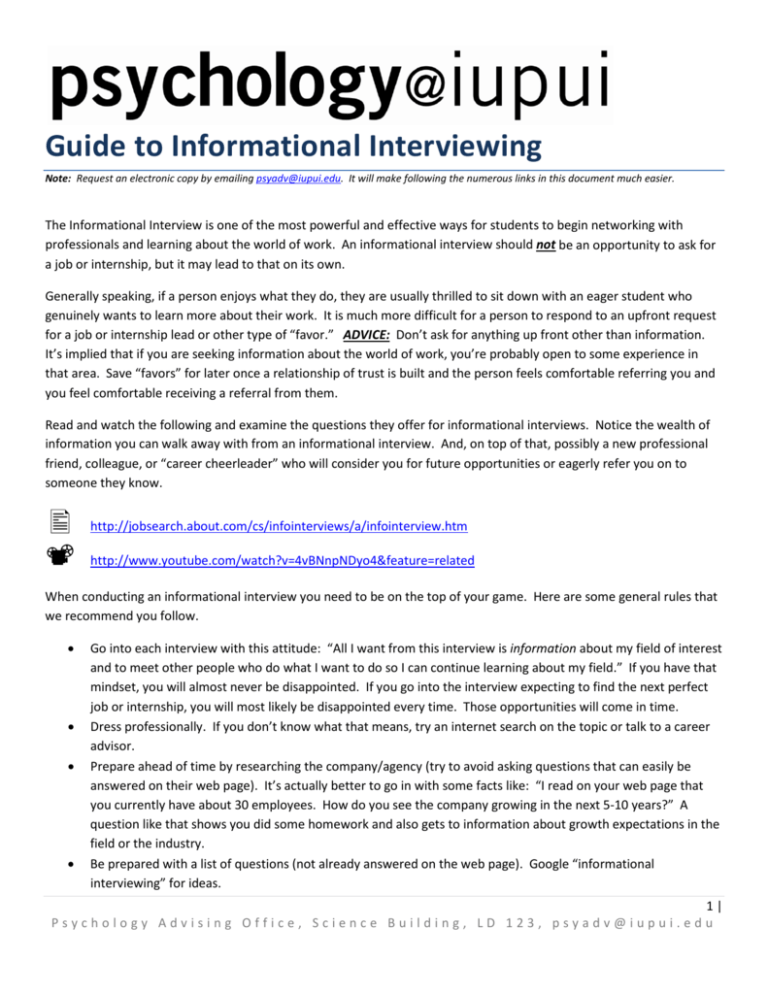
Guide to Informational Interviewing
Note: Request an electronic copy by emailing psyadv@iupui.edu. It will make following the numerous links in this document much easier.
The Informational Interview is one of the most powerful and effective ways for students to begin networking with
professionals and learning about the world of work. An informational interview should not be an opportunity to ask for
a job or internship, but it may lead to that on its own.
Generally speaking, if a person enjoys what they do, they are usually thrilled to sit down with an eager student who
genuinely wants to learn more about their work. It is much more difficult for a person to respond to an upfront request
for a job or internship lead or other type of “favor.” ADVICE: Don’t ask for anything up front other than information.
It’s implied that if you are seeking information about the world of work, you’re probably open to some experience in
that area. Save “favors” for later once a relationship of trust is built and the person feels comfortable referring you and
you feel comfortable receiving a referral from them.
Read and watch the following and examine the questions they offer for informational interviews. Notice the wealth of
information you can walk away with from an informational interview. And, on top of that, possibly a new professional
friend, colleague, or “career cheerleader” who will consider you for future opportunities or eagerly refer you on to
someone they know.
http://jobsearch.about.com/cs/infointerviews/a/infointerview.htm
http://www.youtube.com/watch?v=4vBNnpNDyo4&feature=related
When conducting an informational interview you need to be on the top of your game. Here are some general rules that
we recommend you follow.
•
•
•
•
Go into each interview with this attitude: “All I want from this interview is information about my field of interest
and to meet other people who do what I want to do so I can continue learning about my field.” If you have that
mindset, you will almost never be disappointed. If you go into the interview expecting to find the next perfect
job or internship, you will most likely be disappointed every time. Those opportunities will come in time.
Dress professionally. If you don’t know what that means, try an internet search on the topic or talk to a career
advisor.
Prepare ahead of time by researching the company/agency (try to avoid asking questions that can easily be
answered on their web page). It’s actually better to go in with some facts like: “I read on your web page that
you currently have about 30 employees. How do you see the company growing in the next 5-10 years?” A
question like that shows you did some homework and also gets to information about growth expectations in the
field or the industry.
Be prepared with a list of questions (not already answered on the web page). Google “informational
interviewing” for ideas.
1|
Psychology Advising Office, Science Building, LD 123, psyadv@iupui.edu
•
•
Speak and correspond professionally (avoid slang and proofread everything)
At the end of the interview do two things 1) Ask if there is anyone else they recommend you talk to about your
field of interest (of course, follow up on those HOT referrals within 24-48 hours), and send a professional Thank
You note within 3-5 days of your meeting. See Guide to the Cover Letter and find the section at the end on
sending a professional thank you note.
Preparing for an Informational Interview
Keep in mind the objective of the informational interview is to meet with and gain knowledge from someone who is
doing the kind of work you want to do and developing your Career Network!! Another useful by-product is that this
person could eventually be a great referral for you when you apply for jobs/internship with their company or the
company of someone they know. So, be prepared and make a GREAT impression.
Define what you are looking for.
In addition to being your regular friendly self, it’s a good idea to have a succinct way to express who you are what you
are interested in learning. In common networking jargon this is referred to as the “Elevator Pitch.” Read the following
web articles for guidance.
http://www.quintcareers.com/job-search_elevator_speech.html
http://www.quintcareers.com/writing_elevator_speeches.html
http://www.quintcareers.com/elevator_speech_dos-donts.html
Now that you have read about it, let’s give this a try. Enter your “Sound Bite” or “Elevator Pitch” into the table below.
Sound Bite (make it fit your style).
TIPS:
•
•
Keep in short and sweet – avoid rambling on
Keep it simple - avoid fancy words that you think make
you sound more sophisticated (it doesn’t work)
Research the industry that you would like to learn about
•
O*NET: http://online.onetcenter.org/ is a great place to begin your search for different career areas. Use
O*NET as a tool to get some broad based understanding of your field of interest, job titles, and other jargon that
will help you with further research.
2|
Psychology Advising Office, Science Building, LD 123, psyadv@iupui.edu
•
Don’t underestimate the power of doing a simple Google (or your favorite search engine) search. You can
search “what do applied behavioral therapist do” or “what does an art therapist do.” Get some basic
understanding of your field of interest.
Research to learn which organizations are doing this work in the Indy area
•
•
•
If you have a particular service industry in mind, do a Google search of the Indianapolis (or your hometown) area
as if you were seeking the service or product for yourself or a loved one. For example, if you are interested in
working in the area of adoption services, search for local agencies that provide that service.
There are books in the Psychology Advising Office that might be helpful identifying organizations. Try the
“Rainbow Book” for social and human service agencies. Try the “Book of Lists” put out by the Indianapolis
Business Journal that categorizes the top 25 businesses in central Indiana by industry and company.
If you are interested in the business sector (fundraising, human resources, sales) research local companies that
you would like to work for someday.
Research to find a person of interest to contact
•
•
•
Email, call or talk to people already in your network (family, friends, co-workers) and ask if anyone has a contact
at the organizations you’re interested in.
Post a Facebook or LinkedIn status that says, “I’m looking for a contact at XYZ Company, do you know
someone?”
Search the website for a name of someone doing the work you are interested in, or a hiring manager, or anyone
you can make initial contact with.
Determine the type of contact you have
Let’s look at three different levels of contact and examples of scripts for opening a conversation with this person.
Personal Contact – someone you know well or have met even briefly at one time. The litmus test is if you were to call
this person and mention your name and your last interaction, would they recall who you are?
The introduction: Hi Julie, this is Cindy Smith, I’m Ben’s Mom, and we last talked at Ben and Billy’s basketball
game. (Pause and wait for connection then offer a bit of small talk – How are you? How’s Billy? Nice to talk with
you again.)
The request: Marisa’s Mom told me that you work at Fairbanks Hospital. {enter an appropriate elevator pitch
like: I’m a psychology major at IUPUI and I’m very interested in learning more about addictions counseling}. Is
that what you do? (If yes) – Would you be willing to meet with me so that I can learn more about what you do?
(If no) –Is there someone in your organization you can recommend I talk with to learn more about this field?
Mutual Contact –someone you have never met but have a mutual connection with. This could be through a personal
contact or an organization (church, club, kids, school etc.).
The introduction: Hi, my name is Mark Rugs. You don’t know me but we both go to St. Luke’s church and you
know my friend Larry Jones. (Pause and wait for connection then offer a bit of small talk).
3|
Psychology Advising Office, Science Building, LD 123, psyadv@iupui.edu
The request: Larry mentioned that you work for Rolls Royce in human resources. I am a psychology major at
IUPUI and I am very interested in learning more about the human resources field in a large company like Rolls
Royce. Would you be willing to meet with me so that I can conduct an Information Interview to help me with
some career research that I am doing? (As mentioned in the above example, if you find this person is not the
“best” contact, see if they recommend someone else in their organization.)
Cold Contact – this is someone you have never met but you ran across their name on paper, online, in the news etc.
The introduction/request: Hi (Mr./Ms. or Dr). Smith, my name is Antonio and I am a student at IUPUI studying
psychology. I am doing some research on the career paths of Clinical Psychologist and I ran across your name
online (or on a brochure etc). I have read about the interesting work you are doing in ______ and would like to
ask if you would be willing to meet with me for about a half hour so that I can conduct an Informational
Interview with you to learn more about your work as a Clinical Psychologist?
Keep in mind that when you are making contact for informational interviews, you are NOT asking for a job or internship,
only information about working in this environment. Make sure your message is clear –that you are doing career
research. Be professional. As a point of professional etiquette: When addressing a new contact, especially someone
you don’t know, use their social title and sir name (Mr. Smith or Ms. Jones or Dr. Kennedy). Until invited to be more
casual, error on the side of being more formal.
Conduct an Informational Interview
Now that you have identified an organization and person(s) to interview, and you’ve created a script; it’s time to take
action. Do as many informational interviews as you can – there is always more to be learned about your chosen field
based on the diversity of work settings, different organizational structures, and visions and missions that drive different
organizations.
Be very particular about being on time, prepared with questions, dressed professionally, and look for ways that you can
be of help to the interviewer (volunteer to help with a project, send them interesting articles about the field that you
run across, offer to do some research for academic journal articles that address a “problem” or issue they mention from
the workplace). TIP: Always ask for a business card so that you can do the most important follow up…. send a thank you
note. This is your opportunity to brand yourself as a sincere and grateful professional, so take it seriously.
Questions to ask
Although you do not need 100 questions prepared for the informational interview, it’s a good idea to prepare your top
10. What are your goals? What do you want to learn about the work they do? Maybe you are not as interested in the
company as you are in the position they hold. Identify your questions after you have done your company research and
write them down so that you are prepared. Here are a couple of sites that will be helpful. Be sure to always end your
interview with the question: “Is there anyone else you know who you think I should talk to?”
http://jobsearch.about.com/od/infointerviews/a/infointervquest.htm
http://www.quintcareers.com/informational_interview_questions.html
4|
Psychology Advising Office, Science Building, LD 123, psyadv@iupui.edu
